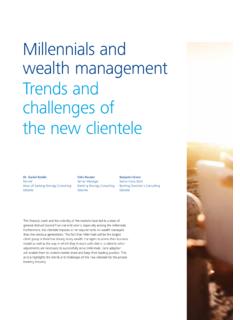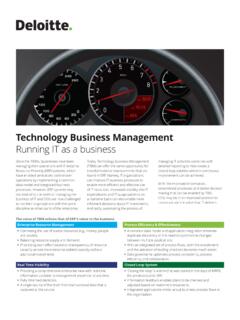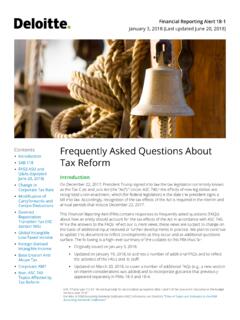Transcription of Tax Guide to Taxation in Cambodia - Deloitte US
1 Guide to Taxation in Cambodia - 2020 Reach, relevance and reliability2 Guide to Taxation in Cambodia - Investment Business environment Currenc Banking and Foreign Tax Accounting, filing and auditing Double tax Setting up a Principal forms of business Business taxation3 .1 O v e r v i e Minimum Deductibility Loss carried Capital gains Tax Transfer A classification of A classification of tax Withholding taxes4 .1 O v e r v i e Payment made to residents Payment made to non-residentsSteering the path to success3 Guide to Taxation in Cambodia - Value-added tax5 .1 O v e r v i e Taxable supply of goods and Non-taxable supply of goods and VAT Block input Other Property Tax on unused Registration tax/ transfer tax/ stamp Stamp Specific tax on certain merchandise and Public lighting Accommodation Advance tax on dividend Import and export Taxes on Personal income Residency Tax on salary Tax on fringe Tax Contact us.
2 Cambodian Services Group4 Guide to Taxation in Cambodia - 2020 List of abbreviationsTermDefinitionASEANA ssociation of Southeast Asian NationsATAccommodation TaxATDDA dvance Tax on Dividend DistributionCamDXCambodia Data ExchangeCDCC ouncil for Development of CambodiaCGTC apital Gains TaxCPMCost Plus MethodCUPC omparable Uncontrolled Price MethodDTAD ouble Tax Agreement GDTG eneral Department of Taxation KHRK hmer Riel KICPA AKampuchea Institute of Certified Public Accountants and AuditorsLOAALaw on Accounting and AuditingLOCELaw on Commercial EnterprisesLOFMLaw on Financial ManagementLOTLaw on Taxation MEFM inistry of Economy and FinanceMLV TMinistry of Labour and Vocational TrainingMOCM inistry of CommerceMTMinimum TaxNACN ational Accounting CouncilNBCN ational Bank of CambodiaNPONon-Profit Organisation OECDO rganisation for Economic Co-operation and DevelopmentPEPermanent Establishment5 Guide to Taxation in Cambodia - 2020 PLCsPublic Limited CompaniesPLTP ublic lighting taxPSMP rofit Split MethodPTOIP repayment to Tax on IncomeQIPQ ualified Investment ProjectRORepresentative OfficeRPMR esale Price MethodRTRegistration TaxSMEsSmall and Medium-sized EnterprisesSTSpecific TaxTNMMT ransactional Net Margin MethodTOFBTax on Fringe BenefitsTOITax on IncomeTOI PrakasTax on Profit PrakasTOSTax on Salary TOS PrakasTax on Salary PrakasUSDU nited States DollarVAT Value Added TaxWHTW ithholding Tax WTOW orld Trade Organization6 Guide to Taxation in Cambodia - Investment climate Business environmentCambodia follows an open market economy.
3 The diversified economy depends heavily on textiles and tourism, and includes significant agricultural, oil and natural gas, financial services, port and logistics services, education and trading is a member of the WTO since 2004. Along with Brunei Darussalam, Singapore, Indonesia, Laos, Malaysia, Myanmar, Philippines, Thailand and Vietnam, Cambodia is a member of the ASEAN, a trade alliance intended to foster economic cooperation, social progress and cultural development among ASEAN members; to protect regional peace and stability; and to establish a joint market for attracting foreign trade and official currency is the KHR, which is approximately 4,000 KHR per 1 USD. Banking and financingCambodia s government has successfully improved financial facilities, strengthen the base of financial institutions and made it easier for the investors to get business financing in Cambodia .
4 Cambodia s banking sector provides a wide range of services, from traditional lending and deposit-taking to corporate and investment banking activities. The banking and finance industries in Cambodia are regulated by the investmentCambodia is a desirable jurisdiction for foreign investors looking to set up operations, primarily because of its attractive corporate structure and favorable tax treatments and tax reliefs/ incentives , political stability, advantageous location, untapped natural resources and land, the proximity of Asia raw materials. Cambodia is also among Asia s lowest-cost workforces. It is relatively easy to set up a business in Cambodia with 100% foreign investment, with the exception of land holding welcomes foreign investment that contributes to its economic growth and specifically favours high value-added investments and technology-based industries by offering attractive incentives for qualifying to Taxation in Cambodia - 2020 Tax incentives Quality Investment Project status investmentsInvestment incentives including tax exemptions are available for a range of business activities, which are not in the negative list of investment activities prohibited by laws.
5 Enterprises are required to submit an investment proposal, feasibility study and other necessary registration documents to the CDC for review and approval before being granted a QIP status. With the QIP status, the Company can enjoy tax incentives as follows: Tax holiday: During the tax holiday period, a QIP receives an exemption of TOI and PTOI. The tax holiday period is comprised of a trigger period, a three-year period, and a priority period. 40% special depreciation: Alternatively, a QIP can choose a 40% special depreciation allowance on the value of the new or used tangible properties used in production, particularly for capital-intensive projects. Import duty exemption : A QIP will receive duty-free import of production equipment and construction materials, together with raw materials in production for export according to the nature of the business. Also, agricultural materials used as inputs in export industries may be exempted from VAT.
6 exemption of MT with proper accounting records approved by the and medium-sized enterprises Customs incentives are also available for SMEs. SMEs may obtain a Customs Duty exemption on imports for production equipment, construction equipment, and raw materials or other production inputs if a business enterprise falls into the promoted list which includes producers and suppliers of clean water, export-oriented enterprises, supporting industries for export-oriented enterprises, domestic sellers, enterprises engaged in research and development relating to information technology, and SMEs operating in an industrial zone. If the incentive is used in a way that does not align with the objective, SMEs retroactively are required to pay the customs duty that they initially were exempted from, and penalties will also be to Taxation in Cambodia - 2020 Accounting, filing and auditing requirementsCambodia s MEF issued guidance on the statutory audit requirements on 10 July 2020 effective immediately (Prakas no.)
7 563 ). The guidance revises the criteria under which all enterprises and NPOs must have their financial statements audited by an independent external auditor, which are summarised as follows:All enterprises ( , except NPOs) that used to have their previous year financial statements audited by an independent external auditor will continue to have their financial statements audited for at least three consecutive years, regardless of whether they meet the above criteria. The deadline to submit audited financial statements with the NAC within six months and 15 days after the closing date of the accounting books. In addition, the GDT will request the entities to submit audited financial statements with the annual TOI if their financial statements are to be on the sub-decree dated on 1 June 2020, NAC has issued the penalties to be imposed for non-compliance with the LOAA (Sub-decree no.
8 79 ), effective from 1 June 2020 as stated in sub-decree. The purpose of the sub-decree is to increase the responsibility of enterprises, NPOs, accountants, and auditors so as to ensure that the LOAA is implemented of entityNew criteriaPLCs and QIPsCompulsoryEnterprises other than PLCs and QIPsMeet any two of the following criteria: Annual turnover above KHR 4 billion (~ USD 1 million); Total assets above KHR 3 billion (~ USD 750,000); or More than 100 the following two criteria: Annual expenses above KHR 2 billion (~ USD 500,000); and More than 20 to Taxation in Cambodia - 2020 The sub-decree covers the following: Enterprises and legal entities registered with the MOC and/or the GDT as large or medium-sized taxpayers; All NPOs registered with relevant ministries and institutions; and All accounting and auditing professionals who are members of KICPAA must obtain the business from NAC in order to provide accounting and auditing services.
9 Double Tax AgreementsThe purposes of this DTAs are mainly to increase the cross-border trade and investment, and to improve the mechanism for tax collection, information exchange and the double Taxation reduction on the same is the summary of DTAs that Cambodia has entered:DTAsSigned dateIn forceCambodia-Singapore20 May 2016 YesCambodia-Thailand7 September 2017 YesCambodia-China13 October 2016 YesCambodia-Brunei27 July 2017 YesCambodia-Vietnam31 March 2018 YesCambodia-Indonesia13 October 2017 in Phnom Penh23 October 2017 in JakartaYesCambodia-Hong Kong20 June 2019 (Signed in Phnom Penh)26 June 2019 (Signed in Hong Kong)YesCambodia-Malaysia3 September 2019 (Signed in Phnom Penh)Not yetCambodia-Korea25 November 2019 (Signed in Republic of Korea)Not yet10 Guide to Taxation in Cambodia - Setting up a businessPrincipal forms of business entityInvestors seeking to carry on a business in Cambodia shall set up a legal entity for their business operation s benefits.
10 The initial business registration must be processed with the Commercial Registration Bureau of the MOC through the online registration procedures. Under the Sub-Decree No. 84 dated 10 June 2020, online business registration is required to streamline and address the procedures, requirements and approvals from different authorities in one-off platform such as: Business registration with the MOC Tax registration (Patent tax certificate, Certificate of tax registration, Tax registration Identification Card, and Notification Letter on the Tax Obligation) with the GDT of the MEF Declaration of the opening of an enterprise with the MLVT Registration of a QIP with the CDCThe applicant shall input information and upload documents as required electronically via one designated website, The application and required documents will be channelled through a platform known as the CamDX to the relevant authorities for review and of entityAccording to the LOCE in Cambodia , the investor intending to open a business is required to set up an entity either in the form of a sole proprietorship, general or limited liability, partnership, public limited liability company, the foreign branch, and the RO, with either a foreign or Cambodian limited companyTo establish a Private Limited company, the entity should have from 1 to 30 shareholders.










